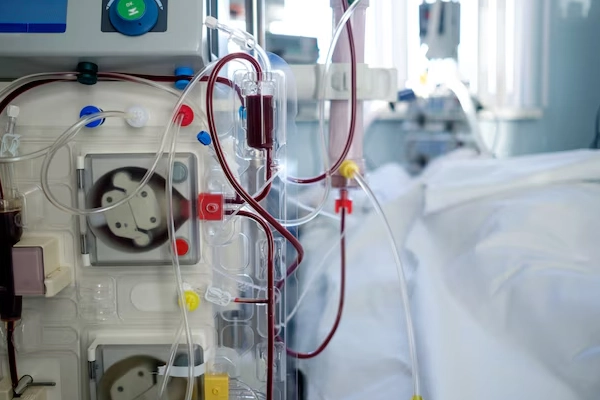Dialysis Unit Nephrology
- Hemodialysis
- Peritoneal dialysis
- Pediatric dialysis
Hemodialysis
A medical procedure to remove fluid and waste products from the blood and to correct electrolyte imbalances. This is accomplished using a machine and a dialyzer, also referred to as an "artificial kidney." Hemodialysis is used to treat both acute (temporary) and chronic (permanent) kidney failure.

Infrastructure

Our Dialysis unit currently has 20 machines for the Out Patients and 2 machines for regular dialysis of the inpatients and 2 Hybrid Machines (Hemodiafiltration -HDF) for the critically ill and those who are compromised hemodynamically.
- We currently do close to 1200 dialysis per month including dialysis in critical care units.
- The water for dialysis is purified by double Reverse Osmosis to enable us performs Hemodiafiltration with Ultra pure water by international standards. We follow stringent quality control measures by monitoring the nutritional status, AV-fistula penetrance, adequacy of dialysis, haemoglobin targets, and catheter infection episodes. Currently we have achieved more than 70% of all the quality indices.
- We have dedicated machines and room for Hepatitis-B & C patients. Our infection control practices are so stringent that we can perhaps at present boast that our unit has 'zero' Hepatitis-C outbreak! And our dialysis catheter infection episodes are under 1% which is on par with any other international dialysis unit.
- We currently have 2 Dialysis Reprocessing Machines (and in the process of acquiring the third one) which can reprocess 4 dialyzers at the same time and gives us vital information about the quality of the dialyzers after each wash.
- All Intensive Care Units (including the General ICU, Paediatric ICU, Cardiac ICU and Cardio-thoracic ICU) has the facility to dialyse critically ill patients. We currently have the facility to dialyse even critically ill children with compromised hemodynamics. GKNMH's Isolation Unit has the facility to dialyse patients with viral infections like Hepatitis C, B and other contagious infections. All Intensive Care Units (including the General ICU, Paediatric ICU, Cardiac ICU and Cardio-thoracic ICU) has the facility to dialyse critically ill patients.
- We perform regular Plasma Exchange sessions for renal and non-renal indications like GBS with excellent result and safety. And with our recent acquisition of the Body Composition Monitor we are able to do appropriate fluid removal during dialysis and to fix the patients Dry weight with excellent precision. Our staffs are continually updated with regular renal nurses training sessions.
- We are currently expanding the Dialysis Unit with 10 more machines and state of the art infrastructure to house them which will be operational in January 2019.


